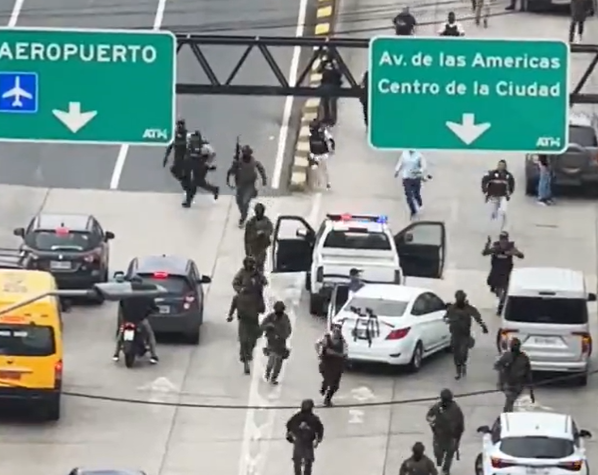It was considered one of the safest countries in Latin America. But in the space of just over a decade, the situation has degenerated, so much so that today Ecuador increasingly resembles a narco-state on the verge of an “internal armed conflict“, as its new president, the 35 year old Daniel Noboa, states.
The images of the incursion of men in balaclavas with rifles and pistols into the studio of public television Tc during a live broadcast went around the world. But even more dramatic were the videos that documented the murder of Fernando Villavicencio, an opposition candidate running for president, on August 9th.
Table of Contents
The elections in October
The winner of the elections was Noboa, scion of the richest family in the country, which with its immense land holdings and dozens of companies controls the trade in bananas and other foodstuffs.
Noboa had announced a tough crackdown on drug cartels, but the first results are not exciting. Last weekend Adolfo Macias, leader of the infamous drug trafficking gang Los Choneros, escaped from prison. Several police officers were kidnapped and numerous bombs were detonated across Ecuador.
On Tuesday, another drug trafficking kingpin, Fabricio Colon Pico of the Los Lobos group, had also escaped from police custody from the city of Riobamba. In all of this, Colonel Pico was accused of being involved in a plot to kill the country’s attorney general. Hence Noboa’s decision to declare a state of emergency. But how did we get to this point?
The Correa model
A decade ago Ecuador was seen outside its borders as a model of economic and social development. Between 2006 and 2016, poverty had decreased from 36.7% to 22.5%, thanks to an increase in public spending which had improved health and education, while unemployment had fallen below 4%, half the average of rest of Latin America.
Behind this success was the hand of President Rafael Correa. Politician and economist of socialist inspiration, Correa took office in 2007 to find a country swamped by enormous public debt and by the rigid limits set by the assistance program of the International Monetary Fund.
The international financial crisis of 2008 made the situation even worse, but Correa took the opportunity to declare the state bankrupt and free it from foreign creditors.
Tensions with the USA
At the same time, Correa distanced himself from the United States, which until then had close cooperation with Ecuador, used as a strategic base for the fight against drug trafficking in Latin America.
Precisely this cooperation was called into question by Correa, who made the appointments of the anti-drug police without consulting Washington. Relations worsened over time, with the former president expelling some US diplomats and offering political asylum to Julian Assange. On the other hand, Correa approached Iran and China. From which he did not disdain generous loans.
Thanks to his successes in the economic and social fields, Correa obtained enormous popular support, which allowed him to remain in power for a decade. Thus resisting a coup d’état and internal political tensions, including those with the Catholic Church. In 2017, however, he was forced to leave office, and then shortly afterwards took refuge in Belgium, where he still lives, following his prison sentence for corruption.
Read also: Exploring the most corrupt countries in the world: the ranking
The turnaround
His successor, Lenin Moreno, despite coming from the same left-wing party, began a path of rapprochement with the United States and implemented neoliberal and austerity policies, signing a new agreement with the International Monetary Fund.
The new course was continued in 2021 by Guillermo Lasso, a member of Opus Dei and the first right-wing president of Ecuador in over twenty years. Lasso carries out privatizations and increased oil production, cutting public spending. Protests erupt across the country, repressed by force. Meanwhile, the new president was accused of corruption by Parliament and in May 2023 he was forced to resign.
It is in these years of political turbulence that organized crime manages to proliferate. Ecuador’s gross domestic product per capita has shrunk by 5% in the last four years, and this has allowed gangs to recruit new forces, even among minors. Mafias based in Colombia, Mexico and even Albania have progressively increased their range of action in the country.
The narco-state
Authorities say Mexican cartels and the Albanian mafia buy Colombian cocaine, send it to Ecuador, then rely on local gangs to pass it through Ecuadorian ports and from there to the United States and Europe.
Gangs also rule the prison system, and prisons have become recruiting centers. Violent deaths nationwide rose to 8,008 in 2023, the government said, nearly double the 2022 figure of more than 4,500. Those who oppose the gangs, like presidential candidate Villavicencio, are eliminated.
Noboa promised to repress crime, starting from prisons. In November he launched the so-called “Phoenix Plan” for security. Which includes a new intelligence unit, tactical weapons for security forces, new maximum security prisons and increased security at ports and airports. Alongside him is the United States, which 200 million dollars in new weapons for the army.
Read also: From the Middle East to Ukraine, from Sudan to Taiwan: the wars of 2023 that threaten 2024












